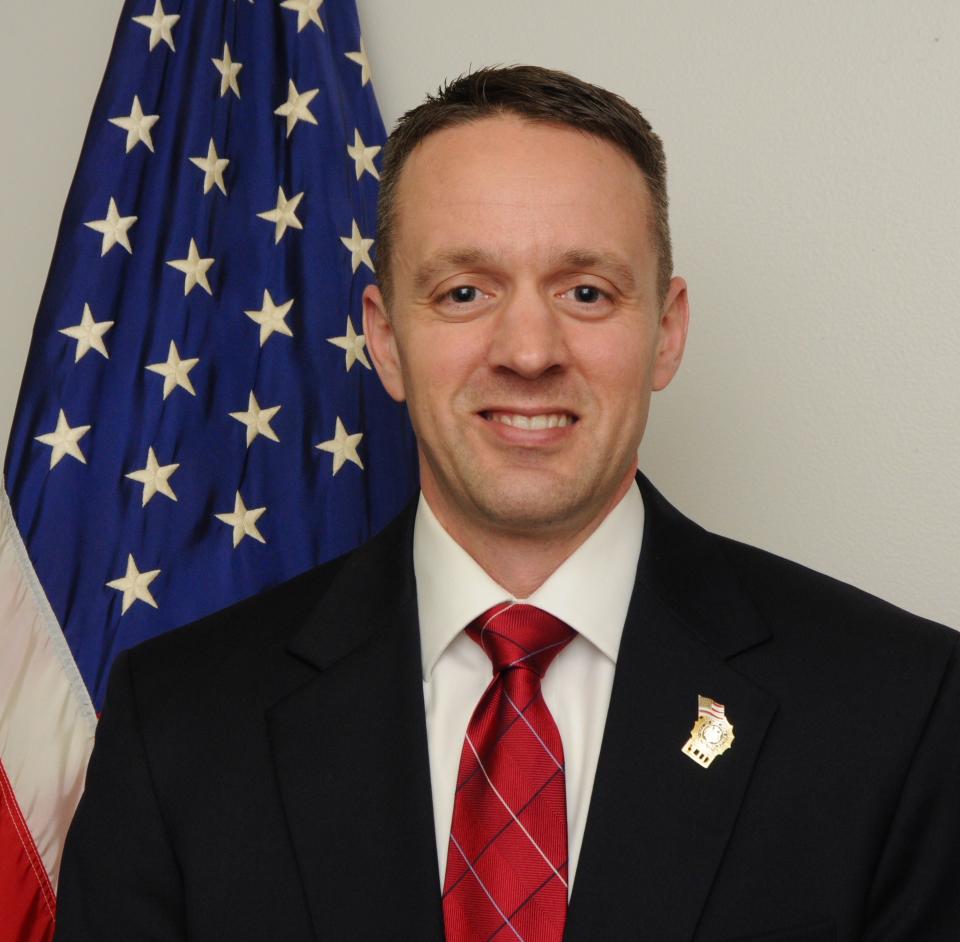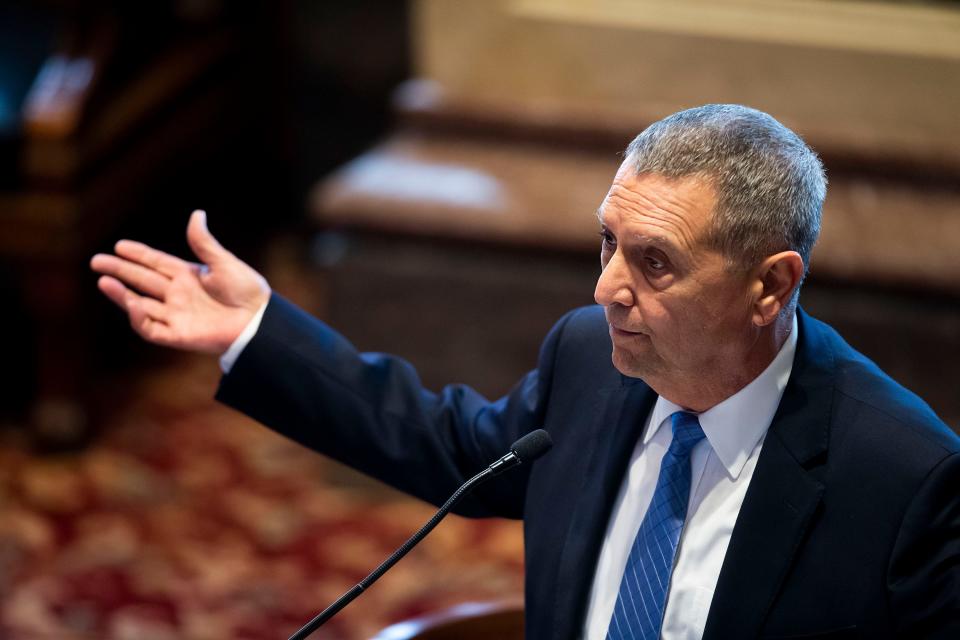'Fox watching the henhouse': Is Iowa's sports betting law too weak to prevent abuse?
Second of two parts
Following the U.S. Supreme Court’s 2018 decision that allowed every state to legalize sports betting, Iowa quickly welcomed the industry.
The Legislature passed a bill in 2019 that let casinos offer wagering on games. The bill also allowed casinos to contract with companies like FanDuel and DraftKings to offer online betting.
The business boomed. The amount of money people in Iowa bet on sports increased from $368 million in fiscal year 2020 to $2.47 billion in fiscal year 2023, which ended last June.
But some elected leaders involved with the bill now say the Legislature needs to rework aspects of the law, especially in light of the recent controversial criminal cases against Iowa State University and University of Iowa athletes and student managers who bet on games.
The state’s legislation dictates that the Iowa Division of Criminal Investigation will investigate sports betting crimes, just as the agency investigates casino gambling and horseracing. But the law does not lay out specific ways that agents can investigate bets. Instead, the law states that sports betting companies must monitor their own users and report problems to the Iowa Racing and Gaming Commission.
"It’s kind of the fox watching the henhouse,” said Tom Coates, director of Consumer Credit of Des Moines and a decades-long critic of the state's gambling industry.
Part 1: How a tech company encouraged Iowa's sports gambling investigation, then walked away

Regulators believe suspicious activity is 'significantly underreported' by sportsbooks
According to state law, company officials must tell the Iowa Racing and Gaming Commission if they see indications of match fixing, money laundering or someone using a fake identity to wager. The law also states that companies must try to prevent athletes, coaches or other team members from placing bets on their own games.
The law, along with rules the commission adopted, does not specify the steps the companies must take to identify illegal activity. However, the law requires company officials to tell the commission about potential crimes they spot. The commission, in turn, can give the information to law enforcement agencies, a team or a sports league.
Sportsbooks did not flag the Iowa and Iowa State athletes, who used betting apps registered to parents and friends, according to the DCI. Instead, state investigators used geolocation software provided by a company that works with the sportsbooks to conduct their own investigation, which resulted in accusations that some athletes had placed wagers on their sports and on their own teams' games, based on subpoenaed records of the account histories.
After critics claimed the DCI had violated the athletes' privacy rights by using the software without obtaining a warrant, the company, GeoComply, cut off the agency's access, and a prosecutor dropped charges in several cases involving Iowa State athletes.
Internally, investigators and regulators have expressed doubts about the industry policing itself, according to emails that the Des Moines Register obtained through an open records request.
In October 2022, then-Gaming Commissioner Brian Ohorilko told DCI Assistant Director David Jobes in an email that Iowa bettors had placed 48.2 million sports wagers in 2021. Among those bets, Ohorilko said, sportsbooks self-reported 17 as suspicious ― about one out of every 2.8 million wagers in the state.
"Our staff is telling me this has been a struggle with the industry, as there were some different expectations as to what is 'suspicious,'" Ohorilko said.
“It demonstrates on a base level that suspicious activity is significantly underreported," Jobes responded.
State Sen. Dan Dawson, R-Council Bluffs, who was on a subcommittee that helped write the 2019 bill and also is a DCI special agent, said he can’t recall why the lawmakers chose to have the companies monitor their own activity. A former gambling investigator, he said online sports betting presents more challenges than gambling investigations at a casino.

Legal online sports betting is a relatively new industry that regulators and law enforcement are still learning how to corral, Dawson said. But Iowa investigators also are far from most of the action at the center of online betting. Checking poker tables and slot machines in one of Iowa's 19 casinos is easier for the DCI than monitoring fraud at basketball games in California.
Iowa DCI agents are stationed at every casino in the state, where they have access to surveillance cameras and digital tracking systems that follow betting activity by individual gamblers. Bettors also must show identification when they arrive at the casinos, where employees use computerized verification programs to check whether their IDs are authentic.
“Regulators could always go into a brick-and-mortar building and say, ‘Hey, show us your books.’ Or, ‘Show us your software.’ Or, ‘Let’s weigh the dice,’” Dawson said.
No equivalents exist in Iowa's online sports betting law.
Edward Martin, a former New York gambling and horseracing regulator who formed the Sports Betting Regulators Association in 2022, said many states have written laws similar to those in Iowa.
“They did not put the state agencies in responsibility to conduct integrity investigations and monitoring,” he said. “They put that responsibility with the sportsbooks.”
Referring to the turmoil that ensued when the DCI tried to take a more active hand in enforcing the laws on college athletes, he added: “What happened in Iowa has raised a red flag for pretty much everyone.”
Iowa lawmaker says regulatory improvements needed for sports betting
Last month, after consulting with the Iowa Department of Public Safety, parent agency of the DCI, the gaming commission tried to amend sports betting regulations.
The changes would have required companies to take extra steps to verify a user's identity. The companies would need to use multifactor identification, sending a code to an account's registered email address or phone number that the user would then need to plug in on the app before using it.
The companies also would have had to take extra steps to verify new users, comparing their selfie photos to government IDs or asking user-specific questions the company has received from a data service like LexisNexis, such as having them verify previous addresses.
Asked during a March 11 Administrative Rules Review Committee about the origins of the proposals, Iowa Racing and Gaming Commission administrator Tina Eick said the governor's office asked her agency and the public safety department to come up with new anti-fraud rules following the "headlines" from last year, a reference to the sports betting scandal.
Nate Ristow, the administrative rules coordinator for Gov. Kim Reynolds, disputed that version of events. He said then-gaming commission director Ohorilko proposed the idea for stricter rules to the governor's staff, which signed off on the plan.
At any rate, the committee rejected the rules, likely postponing the proposed changes for at least a year. The lawmakers on the committee said one particular proposal, which would require betting companies to maintain or buy a list of sports team personnel, was too vague.
State Sen. Tony Bisignano, D-Des Moines, who was on a subcommittee that helped draft the 2019 bill, told the Register that lawmakers need to “tighten (the law) down a little bit.” He said lawmakers did not intend for the industry to regulate itself.
“These are the kinds of things that we really didn’t discuss in detail,” he said. “A lot of it may have been naiveté.”

Dawson said investigators will still need help from the sports betting industry to detect fraud and other crimes, regardless of what the law looks like. Even with casino gambling cases, he said, investigators rely on tips from casino employees about where to look for fraud.
With the current sports betting law, he added, “There’s obviously areas of improvement.”
Tyler Jett is an investigative reporter for the Des Moines Register. Reach him at tjett@registermedia.com, 515-284-8215, or on Twitter at @LetsJett. He also accepts encrypted messages at tjett@proton.me.
This article originally appeared on Des Moines Register: Iowa sports betting scandal: Is the state gambling law too weak?

